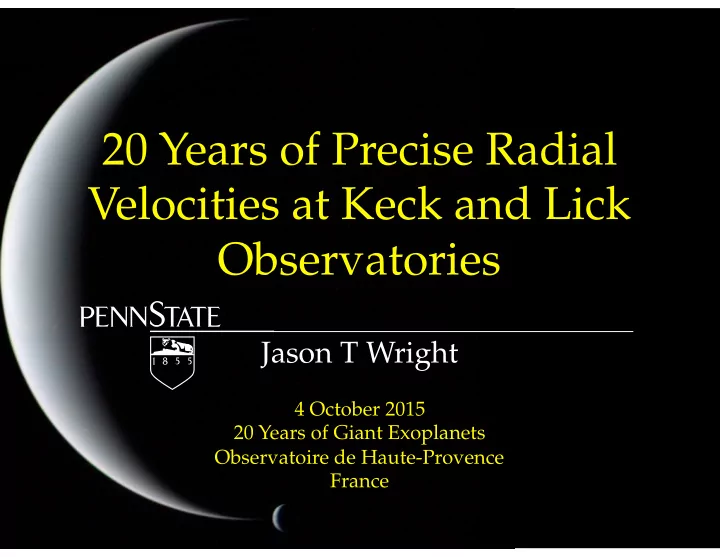

20 Years of Precise Radial Velocities at Keck and Lick Observatories Jason T Wright 4 October 2015 20 Years of Giant Exoplanets Observatoire de Haute-Provence France
Lick Observatory Planet Search 1987–2011 Shane 3-meter 0.6-meter Coude Auxiliary Telescope Siderostat
Lick Observatory Planet Search 1987–2011 0.6-meter Coude Auxiliary Telescope Siderostat
Hamilton Spectrograph Built by Steve Vogt
Hamilton Spectrograph Built by Steve Vogt
800x800 pixels
Original cell at Lick Design by Paul Butler & Geoff Marcy Glass blown by Mylan Healy Method follows Bruce Campbell and Gordon Walker’s HF cell, inspired by Roger Griffin’s use of telluric lines. Iodine suggested by Robert Howard (CIW) Others: Beckers (1977), Libbrecht (1988,1989), Cochran & Hatzes (1990)
Paul Butler at San Francisco State circa 1988
Doppler lab at San Francisco State
Lick Observatory Planet Search 1987–2011 • Discovered 9 of the first 10 exoplanets • Exoplanet Mass Distribution: Rises toward low masses & BD Desert • Eccentric Orbits common! • Discovered the first multi-planet system around normal star.
Lick Observatory Planet Search 1987–2011
Lick Observatory Planet Search 1987–2011 386 stars observed 14,000 precise Doppler velocities published: Fischer, Marcy, & Spronck (2013)
Keck Observatory Planet Search 1994–present
Keck Observatory Planet Search 1994–present
UC Berkeley
Keck Observatory Planet Search 1994–present
HD 37605 Wang et al. (2012)
Jupiter analogs are emerging Feng et al (2015)
Jupiter analogs are emerging Feng et al (2015)
Jupiter analogs are emerging Feng et al (2015)
Some hot Jupiters’ “friends” are cold — they keep their distance Feng et al (2015)
HD 75732 -4.8 -100 -4.9 Radial Velocity [m/s] -120 RHK [Dex] -5.0 -140 -5.1 -160 -5.2 -180 -5.3 2002 2004 2006 2008 2010 2012 2014 Date [Years]
HD 38529 − 4.7 300 RV (m/s) (inner planet removed) − 4.8 200 − 4.9 100 HK R ′ − 5.0 0 − 5.1 − 100 − 5.2 − 200 1995 2000 2005 2010 2015 Year
Wright et al. (2009)
HD 154345 1.0 0.5 Scaled quantity 0.0 − 0.5 S Velocity − 1.0 2000 2005 2010 2015 Date
HD 154345 1.0 0.5 Scaled quantity 0.0 − 0.5 S Velocity − 1.0 2000 2005 2010 2015 Date
HD 154345 1.0 0.5 Scaled quantity 0.0 − 0.5 S Velocity − 1.0 2000 2005 2010 2015 Date
HD 154345 1.0 0.5 Scaled quantity 0.0 − 0.5 S Velocity − 1.0 2000 2005 2010 2015 Date
HD 9986 − 4.84 10 − 4.86 0 − 4.88 RV (m/s) − 4.90 HK − 10 R ′ − 4.92 − 4.94 − 20 − 4.96 − 4.98 − 30 1995 2000 2005 2010 2015 Year
15 ¡YEARS ¡OF ¡GIANT ¡ EXOPLANETS ¡ AT ¡MCDONALD ¡OBSERVATORY PAUL ¡ROBERTSON ¡ NASA ¡SAGAN ¡FELLOW ¡ CENTER ¡FOR ¡EXOPLANETS ¡AND ¡HABITABLE ¡WORLDS ¡ PENN ¡STATE ¡UNIVERSITY, ¡USA
McDonald ¡Observatory 2.7 ¡meter HET ¡10 ¡meter
THE ¡MCDONALD ¡OBS. ¡TULL ¡SPECTROGRAPH ¡ SURVEY Tull ¡Spectrograph ¡located ¡at ¡coude ¡ • focus ¡of ¡2.7m ¡Harlan ¡J. ¡Smith ¡Telescope ¡ White ¡pupil, ¡iodine-‑calibrated, ¡typical ¡ • N= ¡82 ¡ observations ¡at ¡R~60K. ¡ total ¡RMS ¡ Wavelength ¡range ¡~375-‑1000 ¡nm ¡ mean ¡err • 200 ¡(mostly) ¡FGK ¡targets, ¡~1 ¡observing ¡ • run/month ¡1998 ¡-‑> ¡now ¡ Primary ¡science ¡goal: ¡Jupiter ¡analogs ¡at ¡ • 4-‑5 ¡AU ¡ Tull ¡RMS ¡(m/s) Survey ¡support ¡from ¡NASA ¡and ¡NSF
NEW ¡RESULTS: ¡NEW ¡LONG-‑PERIOD ¡GIANT ¡ PLANETS! HD ¡95872: ¡4.6M J ¡@ ¡5.2 ¡AU psi1 ¡Dra ¡B: ¡1.5 ¡M J ¡@ ¡4.4 ¡AU Endl ¡et ¡al. ¡2015, ¡ApJ, ¡submitted
NEW ¡RESULTS: ¡ACTIVITY ¡CYCLES ¡IN ¡RV Solar-‑type ¡activity ¡cycles ¡ • are ¡quite ¡common, ¡and ¡ frequently ¡print ¡through ¡to ¡ RV. ¡ Broad ¡wavelength ¡coverage ¡ • of ¡Tull ¡spectrograph ¡ provides ¡activity ¡tracers, ¡ thus ¡avoiding ¡false ¡ positives. β ¡Vir: ¡P ¡= ¡5.6 ¡yr, ¡RV ¡amplitude ¡9 ¡m/s HD ¡10086: ¡P ¡= ¡7.7 ¡yr, ¡RV ¡amplitude ¡11 ¡m/s (Endl ¡et ¡al. ¡2015, ¡ApJ, ¡submitted)
THE ¡HD ¡219134 ¡ACTIVITY ¡CYCLE Regular ¡telescope ¡access ¡ over ¡long ¡baseline ¡yields ¡ great ¡coverage ¡of ¡both ¡ planets ¡and ¡activity ¡cycles. ¡ HD ¡219134: ¡complete ¡ coverage ¡of ¡11-‑year ¡activity ¡ cycle. ¡ ¡Confirms ¡planetary ¡ nature ¡of ¡long-‑period ¡RV ¡ signal. Johnson ¡et ¡al. ¡2015, ¡in ¡prep.
SUMMARY ¡AND ¡CONCLUSIONS The ¡combination ¡of ¡baseline ¡and ¡precision ¡of ¡the ¡Tull ¡survey ¡is ¡a ¡rare ¡and ¡ • valuable ¡resource ¡for ¡giant ¡exoplanet ¡science. ¡ The ¡addition ¡of ¡HET/HRS ¡extends ¡the ¡survey ¡to ¡M ¡dwarfs, ¡for ¡which ¡very ¡few ¡ • Jupiter ¡analogs ¡are ¡known. ¡ Long-‑period ¡giant ¡planets ¡and ¡activity ¡cycles ¡appear ¡to ¡be ¡common ¡for ¡FGK ¡stars! •
15–25 20 Years of Precise Radial and McDonald! Velocities at Keck and Lick Observatories Jason T Wright 4 October 2015 20 Years of Giant Exoplanets Observatoire de Haute-Provence France
Approaching the Stellar Astrophysical Limits of Exoplanet Detection: Getting to 10 cm/s August 28 – September 18, 2016 Aspen, Colorado, USA Organizers: Fabienne Bastien, Jason Wright, Xavier Dumusque, Gibor Basri (tentative) Aspen Summer Physics Workshop
Recommend
More recommend